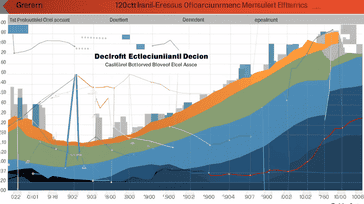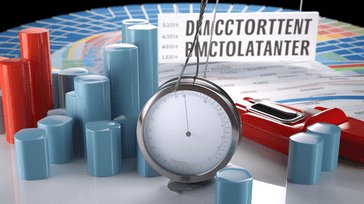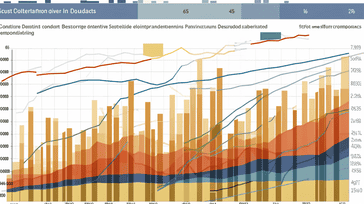Government Deficit: Evaluating its Role in Economic Indicator Analysis

When it comes to evaluating a country's economic performance, there are various indicators that economists and policymakers rely on. These economic indicators provide a snapshot of the health of an economy, helping stakeholders make informed decisions about policy and investment. One such indicator that is closely monitored is the government deficit.
The government deficit refers to the difference between the amount of money a government spends and the revenue it generates. A deficit occurs when spending exceeds revenue, resulting in increased borrowing. While deficits are not inherently bad, they can have significant implications for a country's financial health.
In this section, we will explore the significance of the government deficit in evaluating economic indicators and its impact on a country's financial health analysis. Before diving into the role of the government deficit, let's first understand what economic indicators are and how they help in assessing the overall economic performance of a nation.
Key Takeaways:
- Economic indicators provide a snapshot of the health of an economy.
- The government deficit refers to the difference between government spending and revenue.
- A deficit can have significant implications for a country's financial health.
Understanding Economic Indicators
Economic indicators are essential tools used by economists and policymakers to evaluate the overall health of a country's economy. These indicators provide insights into the current state and future direction of economic activity.
The most commonly cited economic indicators include Gross Domestic Product (GDP), inflation rate, unemployment rate, and the Consumer Price Index (CPI). These indicators are used to measure different aspects of economic performance and to make informed decisions about economic policy.
The Role of GDP
GDP is the broadest measure of economic activity and represents the total value of goods and services produced within a country's borders. It provides insight into the overall growth of an economy, reflecting the increase or decrease in economic activity over a given period.
GDP is calculated in a few different ways, including as the sum of consumption, investment, government spending, and net exports. By tracking changes in GDP over time, policymakers can identify trends and patterns in economic activity and use this information to inform macroeconomic policy decisions.
Inflation Rate
The inflation rate measures the percentage increase in the price of a basket of goods and services over time. This indicator is used to identify changes in the purchasing power of consumers' money and to help policymakers make decisions about monetary policy.
When inflation rises too rapidly, it can lead to a decrease in consumer purchasing power, which can cause economic instability. On the other hand, low inflation can indicate weak demand and sluggish economic growth.
Unemployment Rate
The unemployment rate measures the percentage of the labor force that is currently unemployed and actively seeking employment. This indicator is used to gauge the health of the labor market and to identify trends in job growth or contraction.
High levels of unemployment can lead to reduced consumer spending and weak economic growth. In contrast, low unemployment rates can indicate a healthy labor market and strong economic growth.
The Consumer Price Index (CPI)
The CPI measures changes in the price of a basket of goods and services purchased by consumers. This indicator is used to track changes in consumer prices over time and to help policymakers identify trends in inflation and consumer purchasing power.
By monitoring trends in CPI, policymakers can make informed decisions about monetary policy and adjust interest rates to stimulate or slow economic activity.
Overall, understanding economic indicators is crucial for evaluating the performance of a country's economy and making informed decisions about economic policy. By tracking trends and changes in these indicators over time, policymakers can help promote economic stability and growth.
Key Economic Indicators

Economic indicators are key metrics that economists and policymakers use to assess the overall performance of a country's economy. These indicators provide insights into various aspects of the economy, such as employment, production, and inflation. Some of the key economic indicators that are closely monitored include:
| Indicator | Description |
|---|---|
| GDP Growth Rate | The percentage change in the country's gross domestic product over a specified period, usually a quarter or year. GDP measures the value of all goods and services produced within a country's borders. |
| Inflation Rate | The percentage change in the general price level of goods and services over a specified period, usually a month or year. Inflation erodes the purchasing power of money and can negatively affect the standard of living. |
| Unemployment Rate | The percentage of the labor force that is unemployed but actively seeking employment. High unemployment rates can indicate a weakness in the economy. |
| Consumer Price Index (CPI) | A measure that tracks the changes in the prices of a basket of goods and services purchased by households. CPI is used to measure price inflation and can influence decisions on interest rates and other economic policies. |
By analyzing these key economic indicators, policymakers and economists can gain a better understanding of the economy's strengths and weaknesses. For instance, a high GDP growth rate can indicate a healthy economy, whereas a high inflation rate may indicate an overheating economy. These indicators also play a critical role in determining economic policies and financial decision-making.
Role of Government Deficit
In order to understand the role of government deficit in economic indicator analysis, we must first define what government deficit means. A government deficit occurs when a government spends more money than it collects in revenue. As a result, it must borrow money to make up for the shortfall.
When evaluating economic indicators, the government deficit plays a significant role in the overall analysis. For example, a large and growing deficit may indicate that a government is spending beyond its means, which can lead to a decrease in financial stability and confidence. On the other hand, a small or decreasing deficit may be seen as a positive sign of fiscal responsibility and sustainability.
It is important to note that the government deficit is not the only indicator of economic health. Other factors such as GDP growth, inflation, and employment rates must also be considered.
Government Spending and Revenue
The government deficit is influenced by two main factors: spending and revenue. Government spending includes expenses such as salaries for public officials, infrastructure development, and social welfare programs. Revenue includes sources such as taxes, fees, and tariffs.
When spending exceeds revenue, a deficit is created. However, when revenue exceeds spending, a surplus is created.
Implications on the Economy
The impact of the government deficit on the economy can vary depending on the specific circumstances. In some cases, deficit spending can stimulate economic growth by injecting money into the economy. However, if it is not managed properly, deficit spending can also lead to inflation and a decrease in the value of the currency.
In addition, if a government has a large deficit, it may have to borrow money from other countries, which can lead to a decrease in sovereignty and potentially harmful foreign influence.
Overall, the government deficit is an essential economic indicator that must be carefully monitored and managed to ensure a stable and healthy economy.
Impact on Financial Health Analysis

When it comes to assessing a country's financial health, the government deficit is a critical factor to consider. A high deficit can signal that a country is borrowing more than it can afford. This, in turn, can lead to a rise in interest rates and weakened investor confidence.
One way to evaluate the impact of the deficit on financial health is by looking at the debt-to-GDP ratio. This ratio reflects a country's debt compared to its economic output and is a commonly used benchmark for debt sustainability. When the debt-to-GDP ratio is high, it can indicate that a country is at risk of defaulting on its debt, which can have widespread economic consequences.
According to a report by the International Monetary Fund, when a country's debt-to-GDP ratio exceeds 60%, its economic growth rate tends to slow down by about 0.2% per year.
It's important to note, however, that the government deficit isn't the only factor that affects a country's financial health. Other economic indicators, such as inflation, unemployment, and consumer confidence, also come into play and influence the economy's overall stability.
Therefore, a comprehensive analysis of a country's financial health should consider multiple indicators, including the government deficit, to provide a more accurate picture of the economy's current state and potential for growth.
Interplay with Stock Market Indices
The stock market is often viewed as a barometer of a country's economic health. The Dow Jones Industrial Average and the S&P 500 are two essential stock market indices that reflect the performance of the US stock market. These indices are composed of the stocks of major companies and represent the overall market trend.
The government deficit has the potential to impact the stock market indices. Investors may interpret a high deficit as a sign of poor financial management and lose confidence in the market. On the other hand, if the deficit is managed well, investors may interpret it as a positive sign and invest more money in the market.
"Deficits don't matter." - Dick Cheney
Former Vice President Dick Cheney famously stated that deficits don't matter. However, recent history has shown that they do. In 2011, the United States lost its AAA credit rating from Standard & Poor's, largely due to concerns about government debt and deficits. The downgrade had a significant impact on the stock market, causing a temporary drop in stock prices.
A study by the Federal Reserve Bank of St. Louis found that there is a negative correlation between government debt and stock market performance. This means that as government debt increases, stock market performance tends to decline.
The table below shows the performance of the Dow Jones Industrial Average and the S&P 500 during times of high government debt:
| Year | Dow Jones Industrial Average | S&P 500 |
|---|---|---|
| 2008 | -33.8% | -38.5% |
| 2011 | -5.5% | -7.2% |
| 2020 | -9.7% | -13.3% |
The table shows that during times of high government debt, the stock market indices experienced significant declines. While other factors may have contributed to these declines, the government deficit likely played a role.
Overall, the government deficit can have a significant impact on the stock market indices. Investors closely monitor the deficit and its management, and policymakers must consider the potential market reaction when making decisions about deficit spending and management.
Trade Balance and Government Deficit

Trade balance is a critical economic indicator that measures the difference between a country's exports and imports. When a country exports more than it imports, it has a trade surplus, while a trade deficit arises when imports are higher than exports.
Government deficit can have a significant impact on a country's trade balance. When a government runs a deficit, it typically needs to borrow money to finance its spending. This may lead to an increase in interest rates, which can, in turn, cause the country's currency to appreciate.
An appreciating currency makes imports cheaper and exports more expensive, which in turn, can lead to a wider trade deficit. On the other hand, a shrinking government deficit can help reduce interest rates and lower the value of the currency, making exports more attractive.
The table below illustrates the correlation between government deficit and trade balance in the United States for the period between 2015 and 2020.
| Year | Government Deficit (in billions of USD) | Trade Balance (in billions of USD) |
|---|---|---|
| 2015 | 438 | -745 |
| 2016 | 585 | -792 |
| 2017 | 665 | -861 |
| 2018 | 779 | -920 |
| 2019 | 984 | -854 |
| 2020 | 3,130 | -679 |
From the table, we can observe that the U.S. government deficit has been increasing consistently over the six-year period, with a significant jump in 2020 due to the COVID-19 pandemic. At the same time, the trade deficit has fluctuated, reaching its highest point in 2018 and decreasing in 2020. This data showcases the interdependent relationship between government deficit and trade balance.
Interest Rates and Government Deficit
The relationship between interest rates and government deficit is complex and multifaceted. When a government has a high deficit, it often needs to borrow more money to cover its expenses. This can increase the demand for credit and thus push up interest rates. Similarly, a high level of government debt can also spook investors and lead to higher interest rates.
On the other hand, the Federal Reserve can use interest rates as a tool to manage the economy in response to government deficit. For example, if the government deficit is too high, the Federal Reserve may choose to raise interest rates to regulate the amount of money in circulation and prevent inflation.
The impact of government deficit on interest rates can be seen in historical data. According to a study by the Congressional Budget Office, a $1 trillion increase in government debt could increase long-term interest rates by about 0.1 to 0.3 percentage points.
The Relationship Between Interest Rates and the Stock Market
The stock market is highly sensitive to changes in interest rates, making it an important consideration when evaluating the impact of government deficit. When interest rates rise, it becomes more expensive for businesses to borrow money and this can lead to a decrease in corporate profits and stock prices. However, if government deficit is kept in check, interest rates are more likely to remain stable and not disrupt the stock market.
Conversely, if government deficit remains high and interest rates rise, the stock market may experience a downturn. This can lead to a reduction in consumer and business confidence, which can ultimately have negative effects on the overall economy.
How Interest Rates Affect Borrowing and Investments
The relationship between interest rates and government deficit can also impact the decisions of consumers and businesses. Higher interest rates can make it more expensive for people to borrow money, which can lead to a decrease in consumer spending. Similarly, higher interest rates can make it more expensive for businesses to borrow money, which can lead to decreased investment and economic growth.
On the other hand, low interest rates can encourage borrowing and investment, which can stimulate economic growth. However, this can also lead to inflation if too much money is injected into the economy.
Conclusion
The relationship between interest rates and government deficit is an important consideration when analyzing economic indicators and evaluating a country's financial health. While high deficit levels can lead to higher interest rates and negative impacts on the stock market, the Federal Reserve can use interest rates as a tool to regulate the economy and prevent inflation. Ultimately, understanding the relationship between these two factors is crucial for policymakers and economists in making informed decisions for economic stability and growth.
Interplay with Stock Market Indices
The government deficit can have a significant impact on the stock market indices, such as the Dow Jones Industrial Average and the S&P 500. The stock market reacts to government deficit announcements and indicators, which can cause considerable fluctuations in the market.
One reason for this reaction is the impact of government debt on the economy's overall financial health. When the government is in debt, it may need to issue more bonds to finance its spending. This can lead to higher interest rates, which can negatively impact the stock market's performance. Higher interest rates can also decrease the incentive for businesses to invest, leading to lower stock prices.
The manufacturing and consumer confidence indices are also important indicators for investors. These indices can signal the overall health of the economy and consumer sentiment, respectively. A higher manufacturing index can indicate increased production and economic output, leading to higher stock prices. Similarly, a higher consumer confidence index can signal increased spending and economic growth, which can also lead to higher stock prices.
Impact of Government Deficit on Manufacturing Index
The manufacturing index is closely watched by investors and policymakers as an important gauge of economic activity. The index tracks the level of manufacturing output in a country, which can signal both short-term and long-term economic trends.
The government deficit can impact the manufacturing index in several ways. For example, higher government spending can lead to increased demand for goods and services, which can boost the manufacturing sector's output. However, higher government spending can also lead to higher interest rates, which can negatively impact the manufacturing sector's access to capital and investment.
Overall, the impact of the government deficit on the manufacturing index depends on several factors, including the level of deficit, government spending priorities, and overall economic conditions.
Impact of Government Deficit on Consumer Confidence Index
The consumer confidence index measures consumers' optimism about their financial situation and the overall economy. A higher consumer confidence index can lead to increased spending, which can boost the stock market's performance and overall economic growth.
The government deficit can impact the consumer confidence index in several ways. For example, higher deficit levels can lead to concerns about the government's ability to manage its finances, which can reduce consumers' confidence in the economy. Additionally, higher deficits can lead to higher interest rates, which can negatively impact consumers' access to credit and their spending habits.
Overall, the impact of the government deficit on the consumer confidence index depends on several factors, including the level of deficit, consumer sentiment, and overall economic conditions.
Conclusion
In conclusion, it is clear that the government deficit plays a crucial role in economic indicator analysis. By understanding key economic indicators, such as GDP growth rate, inflation rate, unemployment rate, and consumer price index, we can assess the overall economic performance of a nation.
However, the government deficit cannot be ignored in this analysis. It is essential to understand how government spending and revenue influence the overall deficit and its implications on the economy.
The Significance of Financial Health Analysis
Financial health analysis is crucial in evaluating a country's economic stability and growth. By examining the relationship between debt levels, deficit management, and the overall stability of an economy, policymakers and economists can make informed decisions.
Government Deficit and its Impact on Stock Market Indices
The government deficit can also impact stock market indices, such as the Dow Jones Industrial Average and the S&P 500. It is essential to understand the potential correlation and the market's reaction to government deficit indicators.
Interplay with Trade Balance and Interest Rates
Additionally, the government deficit influences a country's trade balance, including import and export dynamics. It can also impact interest rates, both in the short-term and long-term.
Manufacturing Index and Consumer Confidence Index
Deficit management can affect the manufacturing index and consumer sentiment, which are key indicators of economic health. Policymakers and economists must consider the impact of the government deficit on these indicators.
In sum, the government deficit is an essential factor in economic indicator analysis and financial health assessment. By understanding its impact on the economy and various indicators, policymakers and economists can make informed decisions for the country's economic stability and growth.
FAQ
What are economic indicators?
Economic indicators are statistical data points that provide information about the overall performance and health of an economy. They can include measures such as GDP growth rate, inflation rate, unemployment rate, and consumer price index.
What is the government deficit?
The government deficit refers to the difference between the amount of money a government spends and the amount of money it receives in revenue. It represents the shortfall in the government's budget and is usually financed through borrowing.
How does the government deficit affect economic indicator analysis?
The government deficit can have implications for economic indicator analysis as it reflects the financial health and stability of a country. It can impact factors such as interest rates, trade balance, stock market indices, and overall confidence in the economy.
What is the relationship between government deficit and stock market indices?
The government deficit can impact stock market indices such as the Dow Jones Industrial Average and the S&P 500. A high deficit may cause investors to worry about the country's financial stability, which can lead to market volatility and affect stock prices.
How does the government deficit influence a country's trade balance?
The government deficit can influence a country's trade balance by affecting import and export dynamics. A high deficit may lead to increased borrowing and reliance on foreign capital, which can impact trade relationships and the overall balance of imports and exports.
What is the relationship between government deficit and interest rates?
The government deficit can influence interest rates. Higher deficit levels may result in increased government borrowing, which can put upward pressure on interest rates. This can impact borrowing costs for businesses, individuals, and can have broader implications for the economy.
How does the government deficit affect manufacturing and consumer confidence?
The government deficit can impact manufacturing and consumer confidence, both of which are important economic indicators. High deficit levels may lead to concerns about economic stability, which can have a negative impact on manufacturing activity and consumer sentiment.
What is the significance of evaluating a country's financial health?
Evaluating a country's financial health is crucial for understanding the stability and prospects of its economy. It helps identify potential risks and can inform policymakers and economists in making decisions to promote economic stability and growth.
